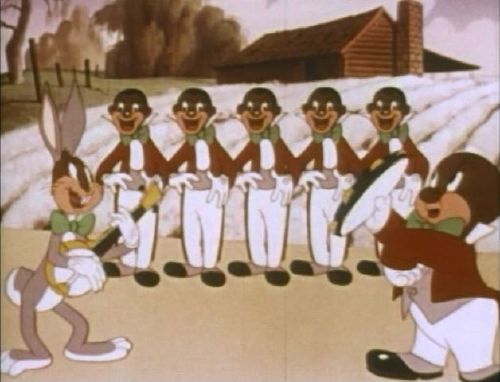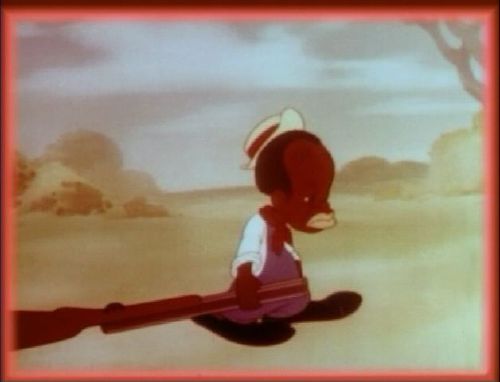Some days, it’s really surprising what you can get for a dollar. Prairie’s long been a dollar store shopper, as it’s a convenient and cheap way to pick up little bits and pieces for around the home. Last Christmas as part of my stack of presents, she picked up a good-sized stack of dollar store DVDs. None of this is high-quality stuff, but that’s not really the point: it’s fun stuff. Old, bad movies make up a lot of it (we had fun watching The Lady and the Highwayman, an old TV movie featuring Hugh Grant in a mullet), but she also picked up a lot of compilations of old cartoons: Betty Boop, Bugs Bunny, and quite a few others.
A couple of nights ago, we popped in Cartoon Craze presents: Bugs Bunny: Falling Hare, mostly a collection of Bugs Bunny cartoons, with a few other non-Bugs cartoons as well, and settled back for a fun evening of cartoon silliness.
What we didn’t expect to discover was that two of the cartoons on the disc are shorts that have been either edited or outright banned for many years due to racist content. They’re fascinating from a historical context, and I actually think it’s kind of neat to have them and be able to see them — but man was it a surprise when we weren’t expecting them to pop up!
The first surprise came at the end of a 1942 short titled “Fresh Hare”, which is mostly your standard Bugs vs. Elmer Fudd hijinks. At the end of the short, as Bugs is blindfolded and about to be shot by a Canadian Mountie firing squad, Fudd grants him a last wish. “Yeah? Let’s see now,” says Bugs. “I wish, eh…. I wish….” He flings off the blindfold and starts dancing around, singing, “I wish I was in Dixie, hooray! Hooray!”
As his wish is granted, the scene fades out and then in…and suddenly we’re greeted with Bugs, Elmer, and the five Mounties now in front of a cotton field, all in blackface, singing both “Dixie” and “Camptown Ladies”.

Prairie and I were both stunned. We’d both certainly known that cartoons like these existed, but neither of us had ever actually seen them — and having them pop up unexpectedly on a disc we’d picked up for a dollar was a bit of a shocker.
Still, that was a few short seconds at the end of an otherwise fairly standard cartoon. An even larger surprise was next to come, with the short “All This and Rabbit Stew”, from 1941. The cartoon itself is essentially another Bugs vs. Elmer Fudd series of gags, only instead of Fudd as the protagonist, we’re greeted with this young lad:

“Ah’m gonna ca-a-a-atch me a ra-a-a-a-bit,” he says as he lopes along. “Oh my god,” said Prairie, and I couldn’t do much more at first than laugh somewhat nervously in amazement. Once you get over the initial shock (and accustom yourself to squirming a bit at watching something so blatantly racist by today’s standards), the cartoon’s not that terrible — as said, it’s basically a Bugs vs. Fudd story…only that’s certainly no Elmer Fudd!
According to one customer review on Amazon’s info page (“Hare Today, but Surely Gone Tomrrow”, by Alajandra Vernon), this is actually one of eleven cartoons censored by United Artists in 1968.
There is some stupendous animation in this Cartoon Craze collection that contains 4 Bugs Bunny episodes, and includes one that is on “The Censored 11” list, a list United Artists made in 1968 of eleven cartoons they deemed too politically incorrect or racist for today’s audiences. “All This and Rabbit Stew” is the offending cartoon, and there is a scene in “Fresh Hare” that also usually gets edited. When Ted Turner bought the cartoons from United Artists, he continued the ban, but Digiview has managed to get “Rabbit Stew” and an uncut version of “Fresh Hare” released.
“Fresh Hare” (1942). Directed by Isadore “Friz” Freleng, animated by Manuel Perez.
Mountie Elmer Fudd chases Bugs, saying “At wast the wong arm of the waw is weaching out and cwosing in on you.” This is an episode that usually has its final scene deleted (where Bugs along with Fudd and five Mounties sing “I Wish I Was in Dixie” and “Camptown Races” in blackface) but is here seen in its entirety.“All This and Rabbit Stew” (1941). Directed by Fred “Tex” Avery, animated by Virgil Ross.
One of the 11 cartoons censored by United Artists, this edition will surely not be around for long. Watching this may make one wince, somewhat like watching “Birth of a Nation,” where the work is brilliant, but goes way over the line by today’s sensitivities.
I actually think it’s rather neat that we ended up with these. It certainly wasn’t what we expected when we popped the disc in, and I’d be cautious about showing them to kids without a parent around…but they’re historically interesting and important (if a little embarrassing), and I’ve long believed that things like this are better kept around so that they can be watched and discussed rather than just swept under a rug or locked in a vault somewhere in a misguided attempt to pretend we never produced things like this.
![]()
“Stand Together” by Beastie Boys, The from the album Check Your Head (1992, 2:47).
I swear I remember seeing those when I was a kid. Definitely the second one, but the first one looks totally familiar too. It also reminds me of the old Tom & Jerry cartoons that had the “mammy” black maid in them… “Taahmas! Taahmas! A mouse, Taahmas!” – they actually still show those ones on Boomerang here in Dublin, it’s awesome!
“All This & Rabbit Stew” is a good cartoon, which featured gags used in other Bugs cartoons, like the log chase, and no different than a typical Bugs cartoon with him against Elmer, Yosemite Sam, etc.
“Fresh Hare” is also one of the best early Bugs Bunny cartoons.
Plus, stereotypes and caricatures were very commmon, like many celebrities from the 1930’s/1940’s for example.
Heck, as a hispanic I don’t see anything wrong with Speedy Gonzales and I enjoy watching the cartoons, though except several with Speedy against Daffy, though that’s because they’re really bad.
Stereotypes are still around, especially in different forms, in shows like “South Park”, which I also enjoy since I usually look past the stereotypes and have a sense of humor unlike Tom Cruise.
Would like to see those two, along with other “banned” classics, remastered on the next “Looney Tunes: Golden Collection” set.
Though they recently, with Volume 3, featured cartoons with minor racial gags (though “Fresh Hare” wasn’t included) with a disclaimer featuring actress Whoopi Goldberg. Along with three Private Snafu cartoons.
Same with Disney, though with unskippable intros from Leonard Maltin.
Especially “Der Fuehrer’s Face”, one of the best WWII propaganda cartoons and the only Donald Duck short to win an Oscar.